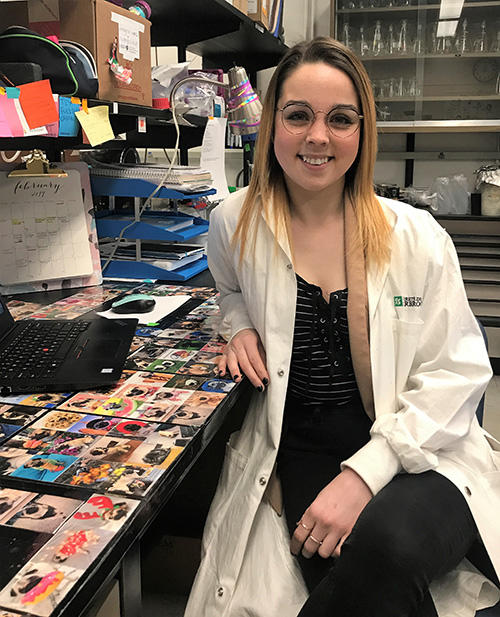Feb. 15, 2019
Environmentally Responsible Fracking: Gabrielle Scheffer at the University of Calgary
A passionate Graduate student studying microbiology, Gabrielle did her Undergraduate Degree in her hometown of Sherbrooke, Quebec, at the University of Sherbrooke. During her Undergrad she tutored students and participated in four research internships. These internships focused on finding antibiotic resistant bacteria in tap water and working with the nitrogen cycle, and are what contributed to Gabrielle “falling in love with Environmental Biology”. Gabrielle is a current Graduate Student in Lisa Gieg’s lab at the University of Calgary and has received two NSERC scholarships, the prestigious Schmeelk Canada Ken Taylor Fellowship, and the Fonds de recherché Nature et technologies (FRQNT) award. Here her passion is being fueled by a positive lab environment and the resources necessary to perform hands-on research. Talking to Gabrielle it is clear that she enjoys what she is doing at the University of Calgary and says, “I like being in the lab. We have a great team, when I show up for work it’s like playing with bacteria. When I found Lisa’s lab I thought, ‘I need to do that’”. She now works with polymers and bacteria to help make the practice of fracking in the Oil and Gas industry safer for both the envronment and those working onsite.

Gabrielle Scheffer
Gabrielle’s interest in microbiology was initially sparked by a drive to help the natural world and the limitless potential of what you can achieve working with bacteria. Due to the microscopic size of bacteria, the organisms Gabrielle works with evolve very quickly compared to other organisms. She explains that “Bacteria are going to adapt and evolve much faster than human beings, because the mutations are much faster due to the speed of replication. It’s interesting because between bacterial species there are just so many differences and so many things you can see and work with. The diversity of what you can do is so fascinating.” Gabrielle has followed her passion for helping the environment and now works to improve the practice of fracking, a process used by Oil and Gas companies which injects liquid at high pressure into the ground to form fissures to extract oil or gas. Gabrielle explains her research and working with microbiology and fracking:
“The CMC polymer I work with consists of long chains of carbohydrate that are all linked together and can become very viscous. In fracking, sand is used to keep the fractures in the ground open; they need to increase the viscosity so that the sand can reach all the way through the fissures. The issue is that you have water from your fracking fluid that is going to be absorbed into the rocks, concentrating the polymers in the fluid, so the viscosity increases a lot, which is how you create ‘filter cakes’. Filter cakes are basically just polymers that stick together and become stuck in the rocks in the fractures. When this happens you don’t have oil and gas moving through your system, and problems occur. Right now they are using oxidizers or chemicals that are not good for the environment, or the people working with these oxidizers, in order to break up the polymers to enable the oil and gas to keep flowing. I am using bacterial enzymes instead, which are not dangerous for people or the environment and are highly effective.”
Gabrielle talks about how working with the polymer carboxymethylcellulose (CMC) is exceptional in the process of fracking and how her use of this polymer makes her work unique. Gabrielle’s work is unique because she is trying to affect change in the industry; by breaking harmful chemicals down into harmless, naturally occurring by-products. Gabrielle’s research has the potential to completely change how Oil and Gas views ecofriendly methods of natural resource excavation. She says “As for my CMC polymer there is not much research surrounding the degradation of that polymer directly, and there’s not a lot of research that I have been able to find using enzymes to degrade the filter cakes I previously mentioned. The use of the enzymes is not original, but the use that we are making of them is different. People like when an industry can avoid using harmful chemicals and use an eco-friendly approach. My polymer, when it is used, will just breakdown to glucose, so it’s not dangerous. We are replacing something that was once dangerous, with something that is not.” By applying her desire for positive change and making the most of her intense work-ethic, Gabrielle is following her passion, and is working towards changing an industry in a positive way.
Changing how society approaches fracking is an ambitious goal, but one that is important for the safety and health of the environment. Gabrielle says that the objective of her work is “to have a positive impact on the world”, both for the environment and those who work closely with the chemicals currently involved in fracking. After completing her Master’s Degree, Gabrielle wants to continue to help the environment by pursuing a PhD focusing on Plastic Biodegradation, and one day wants to have her own lab and teach students. With the passion and drive she exemplifies in the lab, there is no doubt this goal will be realized, and that the positive impact of her research will help curb the growing problem of non-biodegradable products that negatively affect our environment.
An Article By Glynndon Dobson
